One cannot but agree with the postulate that foreign policy is a continuation of domestic policy. For many years, the main content of the internal political life of Poland was determined by the term “Polish-Polish war”. Its most apparent manifestation was the intense rivalry between the Polish political parties “Law and Justice” and “Civic Platform”. In turn, this struggle reflected ideological positions: conservative and liberal. This confrontation divided society and formed two versions of its development. The liberal version is that Poland is a European country like others and should develop per general Western trends. The conservative one assumes that Poland is unique and a model for the modern, postmodern West, not vice versa.
And then historical concepts were used, confirming the “eternity” of this confrontation. In Polish history, the unity and struggle of these ideas are manifested in the conflict between the Piast and Jagiellonian intellectual traditions.
In this paper, Ascolta analyses Poland’s socio-political situation, its attempt to form a separate centre of influence in the European Union, ambitions to renew the geopolitical project of the tri-seas, and internal political sentiments against the backdrop of current threats and challenges.
This Content Is Only For Subscribers
Historical self-determination
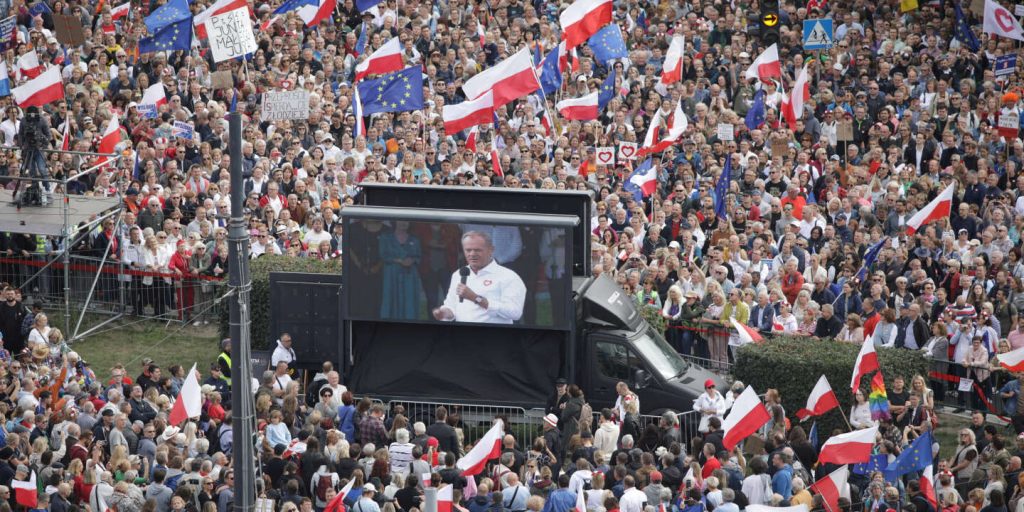
The Piast tradition dates back to the early Middle Ages, the first stage of the existence of the Polish state in the 10th–14th centuries (the royal Piast dynasty), when Poland was an ordinary West Slavic kingdom, developed in the general logic of European feudal states and was focused on interaction with the German principalities. A qualitatively new stage was the emergence of an imperial project in Poland due to a dynastic union with the Grand Duchy of Lithuania and Polish expansion to the east (the Jagiellonian dynasty).
The Jagiellonian idea is a super-idea where Poland acts as a country called upon to civilise the East European Plain, spreading European culture east of its borders. The first and largest practical implementation was the First Polish-Lithuanian Commonwealth, a medieval empire “from sea to sea”, which included, in addition to Poland itself, the territories of present-day Belarus, Ukraine, Lithuania, parts of Latvia, Moldova and Russia. The First Polish-Lithuanian Commonwealth is the apogee of Poland’s development for some Poles and the cause of its historical catastrophe for others.
After the formation of the Third Polish-Lithuanian Commonwealth in the early 1990s and until recently, it seemed that public discussion about the country’s development paths was a thing of the past. A national consensus was reached on the major issues of the future. The path was formulated as a “return to the West”: transition to a market economy and democratic institutions, integration into NATO and the European Union. However, Poland’s “Europeanism” also gave rise to a sceptical attitude towards the dominant trends in the West. The object of right-wing criticism was the European Union and the transformations taking place within Western European societies: multiculturalism, “de-Christianisation,” social atomisation, the collapse of the traditional family and the rejection of traditional gender roles. According to Polish conservatives, the “weakness” of the European Union is a challenge for Poland and a desire to become an internal conservative alternative and a fulcrum for the Old World. Growing self-confidence and scepticism towards the processes in the West brought the conservative Law and Justice (PiS) party of Jaroslaw Kaczynski to power in 2015. And only eight years later, there was a “changing of the guard” – the liberals in Poland again came to power.
Era of Tusk

2023 was a turning point for Polish politics and a triumph for Donald Tusk. He returned to the post of Prime Minister of Poland, and Western media named him “Man of the Year”. They noted that after eight years of Kaczynski’s rule, the country is on the threshold of a new Tusk era, and the winds of change are blowing again.
The 2023 parliamentary elections were called historic for several reasons. First, for the first time in 30 years, voter turnout broke a record and amounted to more than 74%. Second, due to the historicity of the moment, the opposition seized power from the Law and Justice (PiS) party, which has been ruling since 2015.
66-year-old Donald Tusk, who was involved in boxing in his youth, is rightfully called a heavyweight in Poland and the European political “ring”. Donald Tusk served as Poland’s prime minister for seven years, the longest in the post-communist period. In 2014, Tusk left the post of prime minister to become head of the European Council. The politician’s success led his party to a crisis: the new leaders were not as successful in the eyes of voters. In 2021, Tusk, then the leader of the European Union’s largest party, the European People’s Party, wound down his EU career and returned to Poland. He again headed the Civic Platform.
Tusk’s return to Polish politics has added a predictably personal touch to the 2023 election campaign. The head of PiS, Jaroslaw Kaczynski, considers Tusk a personal enemy and calls him guilty of a plane crash over Smolensk, in which Kaczynski’s twin brother, then Polish President Lech Kaczynski, died. PiS’s election campaign was also partly focused on criticising Tusk. Kaczynski and his fellow party members accused him of working for Germany and called Tusk’s party the “German party.”
Although PiS took first place in the elections to the Polish Sejm, the result did not allow it to form a government. Donald Tusk’s “Civic Coalition” partners were the “Third Way” and the “New Left”,” which together gained more than PiS.
The Third Way coalition consists of the Poland 2050 movement (founded by the former editor of the Polish edition of Newsweek, Szymon Holownia) and one of the oldest, but has lost its former support, the centre-right Peasant Party, led by Wladyslaw Kosiniak-Kamysz. The “Union of Left Forces” (in Polish – “Lewitsa”) was made up of the heirs of the PZPR that ruled in the socialist era. It has changed, accepting new movements over time, and is far from communist ideology. One such movement is “Spring,” led by politician Robert Biedron, an openly gay man who consistently advocates for the rights of the LGBT community.
Regarding political views, all three parties can hardly be called allies. It’s interesting that before the elections, these opposition forces had already discussed the idea of unification but then rejected it—primarily because of the position of the leader of Poland 2050, Szymon Holowny, who did not want to be in the shadow of Tusk. However, a real chance to remove PiS from power became a powerful argument for unification and forming a coalition government.

President Andrzej Duda, closely associated with PiS, even at the stage of counting votes, when the prospects of the ruling party losing were already looming, clearly hinted: “The right of the first attempt to form a cabinet will be given to the winner.” And so it happened: taking advantage of his constitutional right and political tradition, Duda entrusted the formation of a new government to Tadeusz Morawiecki, a representative of PiS – the formal winner of the elections. According to the law, the new prime minister can form a new Cabinet within two weeks and use another two weeks to prepare for the government’s approval in parliament. Morawiecki was in no hurry; he used the opportunity to be in the prime minister’s chair until the last moment. PiS used “delay for time” to place as many of its people as possible in the necessary government positions.
As predicted, two months after the parliamentary elections, the Sejm first passed a vote of no confidence in the Morawiecki government and then, by a majority vote, approved Donald Tusk as Prime Minister. Two days later, his government was sworn in at the presidential palace.
Poland has changed a lot in eight years. Instead of leading a country actively seeking to become part of European politics, as it was during Tusk’s first premiership, he has left a country divided by the populism of the last eight years of PiS rule. And even though Tusk’s coalition received a majority in parliament, the 50% that support PiS have not gone away. One should not discount President Andrzej Duda, with whom Donald Tusk’s team must find a common language until 2025. The fact that the head of state can veto any bill of the Sejm, which the current opposition does not have enough mandates to overcome, casts doubt on the prospects of many of their election promises. In addition, numerous state institutions and institutions are filled with supporters of the still ruling party. So, the path of reforms and the implementation of his election promises for Tusk will not be strewn with “rose petals.”
The position of prime minister in the Polish power vertical is considered fourth after the president, Marshal of the Sejm and Marshal of the Senate. However, the prime minister holds the most significant executive powers and absolute power. Realising this, the coalition led by Tusk with great enthusiasm began to clear out the “Augean stables” inherited from its predecessors. And Tusk began with foreign policy. The schedules of his international visits seemed to emphasise the priority of destinations: Brussels, Paris, Berlin, Kyiv, and Washington.
Tusk’s first move defined one of his key foreign policy priorities. Straight from the presidential palace, where his government was sworn in, he went to the EU summit to restore relations with Brussels and implement his ambitious plans, which he spoke about in his keynote speech in the Sejm: “Poland will regain its position as a leader in the European Union.”
The threat of “Polexit” for Poland

May 1, 2024, will mark the 20th anniversary of Poland’s accession to the European Union. During this time, relations between Poland and the EU underwent changes. Now and then, the country experiences a confrontation between Eurosceptics and people who are optimistic about membership in the European Union. This applies to both political elites and ordinary citizens. Until 2015, there was a decline in Eurosceptic sentiment. However, with PiS coming to power, everything changed.
During their eight years in power, conservatives led by Jaroslaw Kaczynski became so carried away by Poland’s “special path” that they brought official Warsaw into conflict with Brussels. European diplomats and politicians have expressed fears that a third Conservative term in Poland could undermine European unity and lead to a crisis for the EU. During PiS’s reign, many laws were adopted that, according to the European Union, were undemocratic and undermined the rule of law.
In 2015, PiS adopted the so-called small media law, which gave the Minister of State Property the power to appoint management and members of supervisory boards at state television channels and radio stations. At the same time, the authorities sharply increased funding for state media. As a result, the government-controlled press turned into a mouthpiece for PiS agitation and propaganda.
Since 2021, abortion has been almost completely banned in the country. In addition, the authorities openly said that they were not going to recognise the rights of the LGBT community. Some Polish local governments controlled by PiS began to adopt declarations in 2019 on the creation of “LGBT-free zones.” However, the noisy campaign quickly stopped – the EU threatened to deprive the municipalities that accepted the declaration of part of their funding.
But the EU’s most serious complaints were about the judicial system reform, which PiS has carried out since 2015. First, the Sejm voted to merge the positions of the Prosecutor General and the Minister of Justice, as well as to strengthen the role of the parliamentary majority in electing members of the State Council of Judiciary. In 2020, additional amendments were made that concerned the release and deprivation of the right to practice those judges who do not recognise judicial reform, make decisions by the norms of pan-European rather than new national law, and publicly criticise the government’s actions. In parallel, Polish Prime Minister Mateusz Morawiecki asked the country’s Constitutional Court to decide what is more important: the Polish constitution or EU laws. The request to the Constitutional Court outraged the central authorities of the European Union, who argued that the supremacy of EU laws concerning the legislation of individual countries is spelt out in the fundamental treaties of the European Union, and Poland voluntarily joined these treaties and the union. In the end, the Constitutional Court of Poland, which postponed the decision several times, nevertheless ruled, as expected, that the Polish constitution is more important than European laws. Then, many in Europe started talking about “polexit” – Poland’s exit from the EU, but it still didn’t come to that. The European Commission “limited itself” to freezing Poland’s access to its share in the pan-European fund to combat the consequences of the pandemic, which amounts to more than 60 billion euros in the form of grants and soft loans.
“One among one’s own”
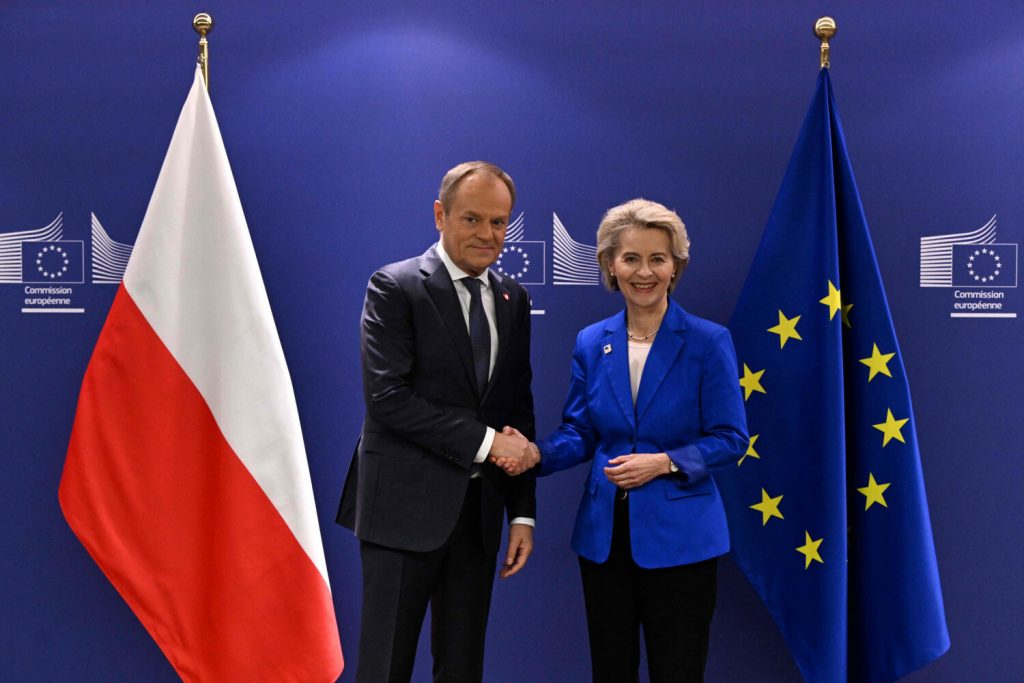
The change in mood in Warsaw after the elections was also felt in the EU. Tusk’s first visit to Brussels brought him his first success. The politician went to the capital of Belgium, where the new prime minister served as head of the European Council for five years, as an old friend and colleague. Without particularly straining, he fulfilled his first election promise – to return the money previously frozen by the EU. For Tusk’s promise to restore the rule of law in Poland and carry out reforms, the European Commission agreed to release part of the funds owed to Poland – 5 billion euros. It is this amount of more than €60 billion allocated to Poland as part of the program to stimulate recovery from COVID-19 and blocked by the EC due to dissatisfaction with the policies of the previous authorities of the country that the EU decided to transfer to Poland.
“I applaud your commitment to putting the rule of law at the top of your government’s agenda. We need to catch up,” said EC President Ursula von der Leyen at a joint press conference with Donald Tusk; however, what the Polish prime minister tried to present as his first great success was not formally such.
As the Financial Times notes, the EC made the decision to allocate money to Poland last month and initially did not make it dependent on the country’s fulfilment of the legal conditions previously set by Brussels but carried out this decision as a package of emergency measures related to energy and the transition to a “green economy.” In general, Brussels gave Tusk a gift for the upcoming Christmas. To ensure that the unfreezing of money does not turn out to be a one-time stimulus action, the coalition government will have to, as Ursula von der Leyen put it, “work hard”, and the European Commissioner for Justice Didier Reynders directly stated that the remaining tens of billions of euros without concrete reforms restoring independence the judiciary, Poland will not see.
“Rolling up its sleeves,” Warsaw set about implementing the wishes of the European Commission and, on February 20, 2024, presented a specific plan for reforming the judicial system. Just a few days later, there was feedback from Ursula von der Leyen, who showered Poland with “Eurorain”: “I have good news. Next week, the panel will make two decisions on European funds that are currently blocked for Poland. This will allow Poland to allocate up to 137 billion euros,” said the head of the European Commission, Ursula von der Leyen, during a press conference in Warsaw.
We are talking about funds from the unification funds and the Next Generation EU plan. Poland will also have access to 60 billion euros earmarked for recovery from the COVID-19 pandemic and transition away from fossil fuels, as well as about 1.2 billion euros will be transferred to farmers blocking the Ukrainian-Polish border. Polish Prime Minister Donald Tusk was jubilant and called this day very important because, from the first days of his tenure as prime minister, his goal was, among other things, “restoring the rule of law and democratic standards.”
Change of vector and return to “The Old Europe”
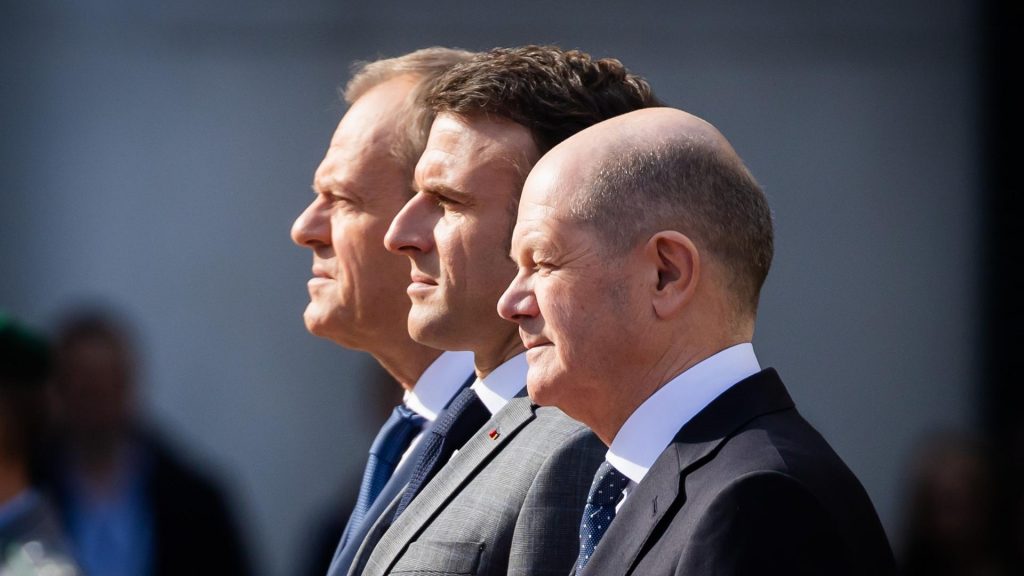
Donald Tusk’s second foreign policy step is restoring relations with the “old” Europe. From 2007 to 2014, when Tusk was prime minister, Germany, France, and Poland could agree and unite into a single powerful engine that moved the European Union forward. The effectiveness of this trio of catalysts helped Tusk become President of the European Council, one of the most important bodies in the EU.
However, with the coming to power of Jaroslaw Kaczynski’s Law and Justice party, relations between Poland and the “old” Europe, especially with Germany, began to deteriorate. Kaczynski’s ambitions, as well as his claims to leadership and Poland’s unique place in Europe, faced, to put it mildly, bewilderment in Berlin. Then, historical memory became essential in shaping bilateral relations between countries. And in this sense, in terms of juggling facts and the scope of using history for political purposes, Kaczynski and his team can be compared with the famous Kremlin “historian”: just as the West, according to Putin, has constantly threatened Russia, so Germany has always remained the main enemy for Poland.
In Warsaw they concluded that German-Polish tension began long before World War II. They recalled that Prussia played an essential role in the division of the Polish-Lithuanian Commonwealth at the end of the 18th century. The military campaign of the Teutonic Order in the Middle Ages became a metaphor for the eternal threat from the German neighbour. Continuing to play the historical card, 77 years after the end of the Second World War, PiS announced the creation of the War Loss Institute, which will deal with financial compensation for the damage caused by the German and Soviet occupation. And the words did not diverge from the actions: on the eve of the next anniversary of the start of World War II on September 1, 2022, the leader of the Law and Justice party, Yaroslav Kaczynski, said that Poland would demand reparations from Germany for more than 1.3 trillion dollars for damage and losses in World War II war. Then, Tusk, who is in opposition, said that this was an internal PiS campaign aimed at increasing the party’s popularity, and it had little relation to reparations and compensation for harm.
By the way, PiS did not call Tusk himself anything other than a “German spy”, and his party “Civic Platform” was called “pro-German”. In the political history of the twentieth century, such precedents have already occurred. In 1917, the Provisional Government also called Vladimir Lenin and his party RSDLP (b) in Russia. History repeated itself in the form of a “farce.”
In Germany, they did not comment on Kaczynski’s statement, but a particular “sediment,” as they say, remained. Other less critical issues showed the growing estrangement between Warsaw and Berlin: the dispute over Polish language lessons and the status of Poles in Germany—different positions on energy and climate policy issues. With the onset of Russia’s full-scale aggression against Ukraine, Polish Prime Minister Morawiecki made accusations against Germany for the fact that the authorities of this country did not provide sufficient support to Ukraine, even though Germany is Kyiv’s most significant donor in continental Europe.
The move mentioned above by Warsaw created severe pressure on Berlin. In short, Poland under PiS used various reasons to criticise Germany’s behaviour, both in the economy and in politics. In addition, the NATO factor was used to put pressure on Berlin. The Polish authorities have constantly emphasised that the alliance countries should spend 3% of GDP on defence. In 2023, Poland allocated a record 4% of its GDP to defence. While Germany only in 2024 indicated a figure of just over 2%. Some experts saw in Warsaw’s behaviour not only a desire to become an alternative centre of Europe but also a desire to please Washington and to strengthen its position after Brexit as the main ally of the United States in the European Union.
Great Britain also pitted Poland against Germany. Boris Johnson rightly called Warsaw the closest European NATO ally in security and defence, not to mention economic relations. One of the geopolitical goals of the London administration in Europe before the start of the full-scale Russian invasion of Ukraine was precisely to prevent a rapprochement between Russia and Germany. Warsaw successfully coped with the implementation of this goal because Poland is one of the rare countries in Europe that opposed both Germany and Russia.
After leaving the European Union, Great Britain did not abandon its attempts to become a new centre of influence in Europe and the world, which was confirmed by the “Global Britain” strategy. It may be recalled that before the start of Russian full-scale aggression, then Prime Minister Boris Johnson tried to create a military alliance under the auspices and “nuclear umbrella” of Great Britain with the participation of the Baltic countries, Ukraine, Turkey and Poland, which was sometimes called “Intermarium.” By the way, the idea of creating such a union of states was far from new and had its roots in the 19th century, but it was first formulated as a political doctrine by Józef Pilsudski. Then, it was “old” Europe that opposed this idea, seeing in it an alternative to NATO and an encroachment by Britain on the leadership of Germany and France in Europe.
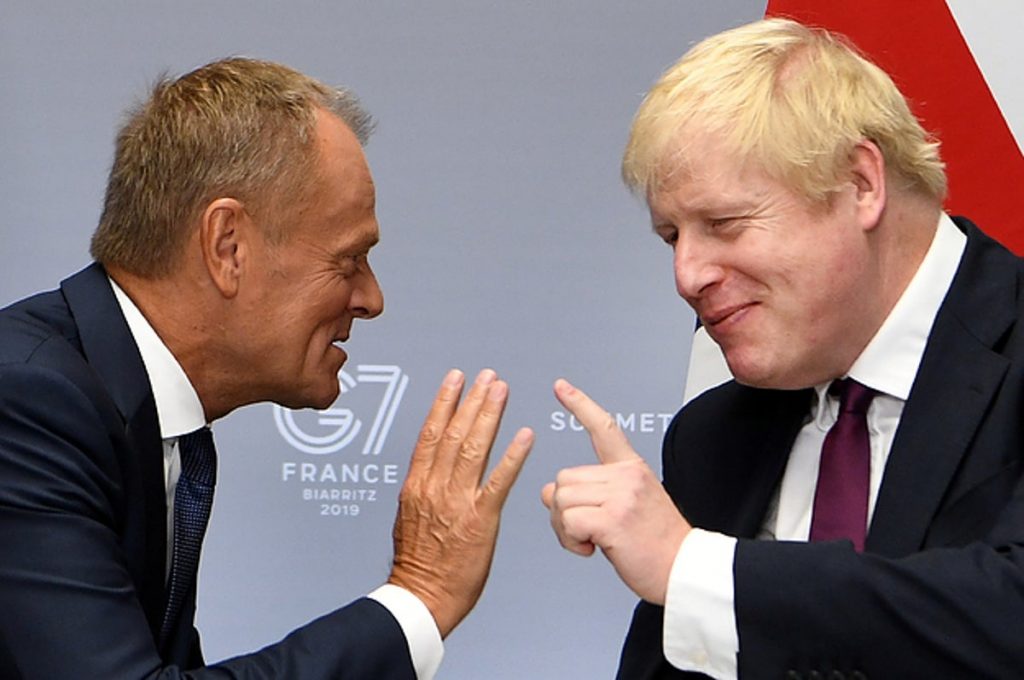
Prime Minister Tusk and Polish Foreign Minister Sikorski went to Paris and Berlin to correct Kaczynski’s “legacy” in relations with Germany and France. Suppose we have already mentioned the “special” relations between Poland and Germany. In that case, the reasons for the cooling in relations between Paris and Warsaw are banal – in 2016, Poland simply “dumped” the French. The Poles promised to buy 50 H225M Caracal helicopters from the French Airbus Helicopters to compensate Paris for losses caused by the failure of the deal with Russia on the Mistral ships. The deal was valued at more than $3 billion. The situation was aggravated by the fact that Warsaw took an active part in forcing the French to abandon one of their best contracts, namely the sale of Mistrals to Russia, in connection with the annexation of Crimea and the war in Donbas in 2014.
The purchase of Caracal helicopters (“Caracal” means “steppe lynx”) was supposed to, in a sense, make up for the losses of France. In the republic, many considered the behaviour of the Poles to be a betrayal. “When it became known about the cancellation of the order for Caracal helicopters, the head of Airbus, Fabrice Brégier, said that he had never encountered such rudeness in his life. The cynicism of the situation was revealed when Warsaw announced that instead of Caracal, it would buy 21 Black Hawk helicopters from the local subsidiary of Lockheed Martin. After this, Francois Hollande cancelled the Franco-Polish summit and his visit to Warsaw. Polish-French relations were “mothballed” and came to nought.
Under the next French president, Emmanuel Macron, the relationship was a seesaw. At first, it deteriorated sharply: even during his election campaign, he declared that he would “punish” the illiberal democracies of Hungary and Poland and return them to the “rule of law.” This could not but affect the attitude of the Polish authorities towards the new leader of France. Moreover, all this was aggravated by Macron’s rhetoric that Poland would never determine the policy of the European Union.
In the changing geopolitical situation after Brexit, Macron saw a “window of opportunity” to strengthen France’s leadership position in the European Union. Naturally, this led to contradictions between Germany and Angela Merkel, who was sceptical of Macron’s foreign policy “innovations” and his position to change the decision-making mechanism in the EU, replacing “unanimity” with a simple majority of votes. Merkel did not want to change the status quo that had developed in the EU, and in all these reforms, she saw an encroachment by Paris on Berlin’s leadership in the EU. Then Macron turned his sights to Eastern Europe and, more precisely, to Warsaw, which was openly in conflict with Berlin. In February 2020, he went on a visit to Poland, showing by all appearances that he is trying to break the “wall of misunderstanding” between “old” and “new” Europe and sees Poland as a strategic ally of Paris. Macron attempted to intensify the “Weimar Triangle” format by emphasising the unique attitude towards Poland.
It is worth recalling that the Committee to Support Cooperation between France, Germany and Poland, known as the “Weimar Triangle”, was created in August 1991 on the initiative of German Foreign Minister Hans-Dietrich Genscher. He wanted to use the post-war experience of Franco-German rapprochement to strengthen ties with Poland. In addition, the “triangle” was called upon to actively support Poland’s rapprochement with NATO. These goals succeeded: Poland joined NATO in 1999 and the EU in 2004.
Macron’s “flirting” with Warsaw led nowhere. The United States remained Poland’s strategic partner, and the main reason for Poland’s calm attitude towards this format was the conflict with the EU leadership, for which Warsaw accused Berlin and Paris. However, everything changed in 2022. On the eve of Russia’s full-scale invasion of Ukraine, on February 8, 2022, at the invitation of German Chancellor Scholz, the presidents of France and Poland, Emmanuel Macron and Andrzej Duda, gathered in Berlin to discuss the situation around Ukraine in the “Weimar Triangle” format. However, neither the Weimar Triangle summit in Berlin in 2022 nor the two meetings of Macron, Scholz and Duda in 2023 (in Munich in February and Paris in June) produced any tangible results.
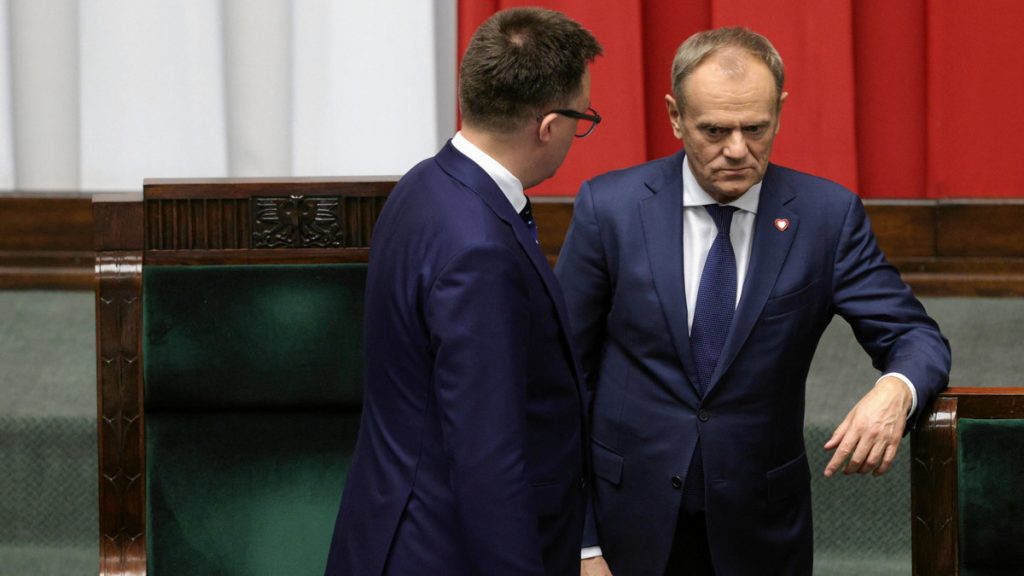
After the government in Poland was headed by Donald Tusk, Paris, Berlin, and Warsaw had a chance to bring their positions closer together, strengthen cooperation and revive the activities of the Weimar Triangle. Poland, in turn, is trying to use every opportunity to show its partners that the situation has changed and Warsaw is ready to become the ally that Western capitals want it to be.
To do this, in shuttle diplomacy mode, on February 12, 2024, Tusk visited Paris and Berlin for several hours. In the French capital, Donald Tusk said that he was glad to see the Weimar Triangle restored and added: “… Poland’s position is very similar to France’s on all the most important bilateral, European and geostrategic issues.” Macron reciprocated, emphasising that in the new Polish government, Europe had “a partner who can be trusted, who is pro-European and clearly understands European security and its main challenges.”
North Atlantic affairs turned out to be a particularly pressing topic against the backdrop of the approaching presidential elections in the United States and the growing prospect of victory for Donald Trump, who, the day before, promised not to defend European countries until they increased defence spending. Under PiS, Poland was one of those European countries that preferred to rely more on the United States and American weapons rather than support the idea of European “autonomy” from an overseas partner. In this sense, Macron looked like an antipode, promoting the idea of creating a “European army” and sovereignty in matters of European security, which did not find responses among the majority in Europe.
This idea was promoted for many years by the founder of the Fifth Republic, Charles de Gaulle, in particular by withdrawing France from the military structures of the North Atlantic Alliance in 1966, although not from the pact itself. Now, Poland’s accession to this vision is dictated by America itself, or rather by the understanding of the European Union, which, instead of relying solely on the United States, is becoming an increasingly equal partner within NATO in ensuring its security. This becomes especially relevant against the threat of Tusk’s namesake, Donald Trump, coming to the White House, who, during his election campaign, is making increasingly shocking statements regarding the future of NATO and the European Union.
Germany, which had previously argued with France due to its reluctance to quickly modernise its armed forces, relying on the United States, also did not escape Warsaw’s change in course. In Berlin, they noted with undisguised optimism that, for the first time, the Polish government has stated that strengthening European defence capabilities in security does not contradict a strong NATO. Summing up his visit to France and Germany, Tusk emphasised that “The three capitals (Warsaw, Paris, Berlin) must give a clear sign that Europe will not give in on the issue of Ukraine; Putin must see and will see that there will be nothing such as fatigue from Ukraine. We will not abandon Ukraine; here, the Weimar Triangle can play a leading role.”
The end of the Three Seas Initiative?
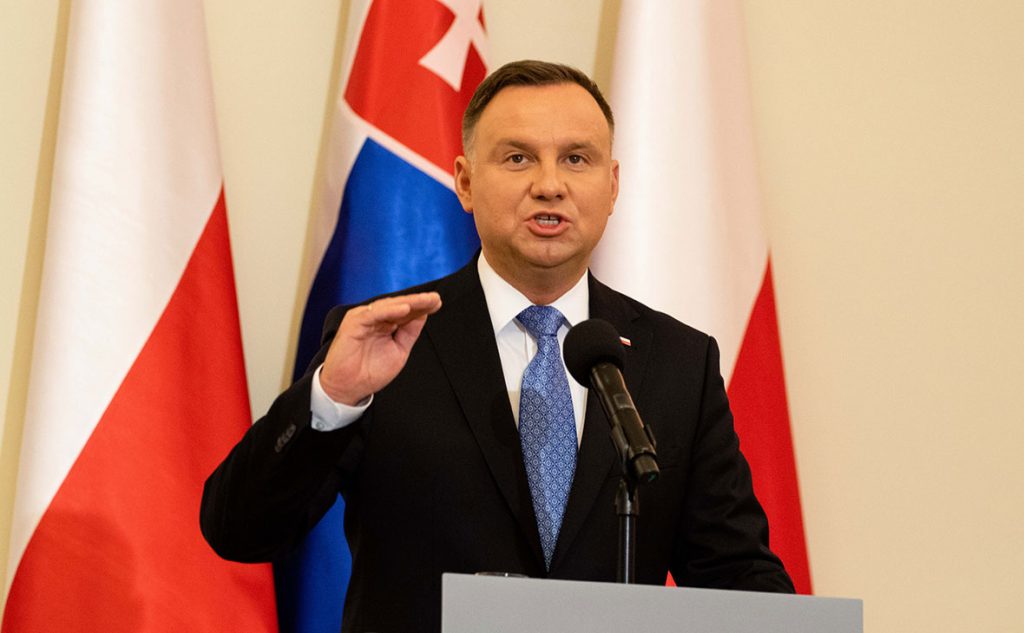
The desire of the ruling Law and Justice party to define a special place for Poland in the European Union encouraged Warsaw to produce ambitious regional projects to outline a bid for leadership not only in Eastern but also in Central Europe. Such projects can easily include the “Three Seas Initiative”. It was founded in 2016 and united 12 countries of Central and Eastern Europe – Austria, Bulgaria, Hungary, Latvia, Lithuania, Poland, Romania, Slovakia, Slovenia, Croatia, the Czech Republic and Estonia – that is, countries located along the axis from the Baltic to the Adriatic and the Black Sea.
In 2021, Ukraine joined the project as a partner, and in 2023, Moldova. Although the Three Seas was not formally a political project, some analysts saw behind it old Polish geopolitical concepts dating back to the era of Jozef Piłsudski. The current Three Seas Initiative also had immediate predecessors in the interwar period of the 1920–1930s of the 20th century. Among them, the most famous was the so-called Little Entente, which united the newly created states of Central Europe – Romania, Czechoslovakia and Yugoslavia, as opposed to Hungary. Attempts were also made to develop a Baltic Entente consisting of Lithuania, Latvia and Estonia, which Poland tried to join. However, the outbreak of the Second World War put an end to the former players in the region and erased their ambitions into dust.
At the heart of the Three Seas Initiative is the idea of reformatting the Eastern European infrastructure from the “East-West” line to the “North-South” line. In 2023, the formation of the project as a “gas coalition” was discussed at the Three Seas Initiative Congress in Lublin. This refers to creating infrastructure for gas transportation between the Baltic, Black Sea and Adriatic regions. In particular, this task should be fulfilled by the “vertical gas corridor” – from the Polish Swinoujscie (where the liquefied natural gas terminal is located) to the Croatian island of Krk.
The most significant benefit from this was Poland, which in recent years has been diligently building its own “energy mini-empire.” Last year, the Poles established gas supplies from fields in Norway thanks to the Baltic Pipe underwater pipeline that was put into operation. In addition, they receive liquefied natural gas delivered by sea to terminals located on the coast. The Poles hope to use this gas to close their own energy gaps and make money on its resale. Poland also became a beneficiary from participation in the development of common transport corridors; we are talking about the Rail-2-Sea railway line and the Via Carpathia highway.
It is worth noting that Rail-2-Sea is a project under the auspices of the Three Seas Initiative. It includes developing and modernising the railway line between the Baltic port of Gdansk and the Black Sea port of Constanta. This route crosses four countries: Poland, Slovakia, Hungary and Romania. In turn, “Via Carpathia” is a highway under construction from Klaipeda to Thessaloniki, which will pass through the territory of seven countries. It is officially scheduled to be completed by 2025. To further promote this project, the Polish authorities argued that Via Carpatia was particularly important in the context of NATO infrastructure. After all, the road will run along the eastern border of the European Union and NATO. Accordingly, if necessary, it can facilitate the transportation of troops and heavy equipment from north to south. After Russia invaded Ukraine, President Vladimir Zelensky announced his desire to join the Three Seas Initiative. He suggested expanding the interpretation of the project’s objectives. The development of transport infrastructure, according to Zelensky, can provide a reliable rear in the event of a military conflict between the countries of the region and Russia, just as existing communication routes now provide supplies of weapons and fuel from the West to Ukraine itself.
Without a doubt, the new Polish Prime Minister, Donald Tusk, and the new Foreign Minister, Radoslaw Sikorski, will face the question: what to do with the Three Seas Initiative? Today, the main priority for Warsaw is restoring relations with the “old” Europe, and the Three Seas Initiative seems to be out of this agenda. Therefore, one of the two (together with Croatia) countries that initiated the Three Seas Initiative may lose interest in this initiative. This may be due to pure politics because it is unlikely that the Tusk government will want to develop perhaps the most critical foreign policy project of PiS.
The Three Seas Initiative is an example of creating a regional cooperation mechanism in which the United States was interested. Here, the interests of both countries coincided: on the one hand, this is one of Washington’s foreign policy tasks – to build relations with blocs of states within the EU while relying on the most “loyal” players (in this case, Poland). On the other hand, this is the realisation of the ambitions of Warsaw itself, which aspires to regional leadership. After Ukraine was granted the status of a “participating partner,” the Three Seas Initiative acquired the character of an economic and military-political organisation. And now, to be or not to be the Three Seas Initiative depends not only on Warsaw but also on Washington and, more precisely, on the results of the upcoming presidential elections.
A faithful ally
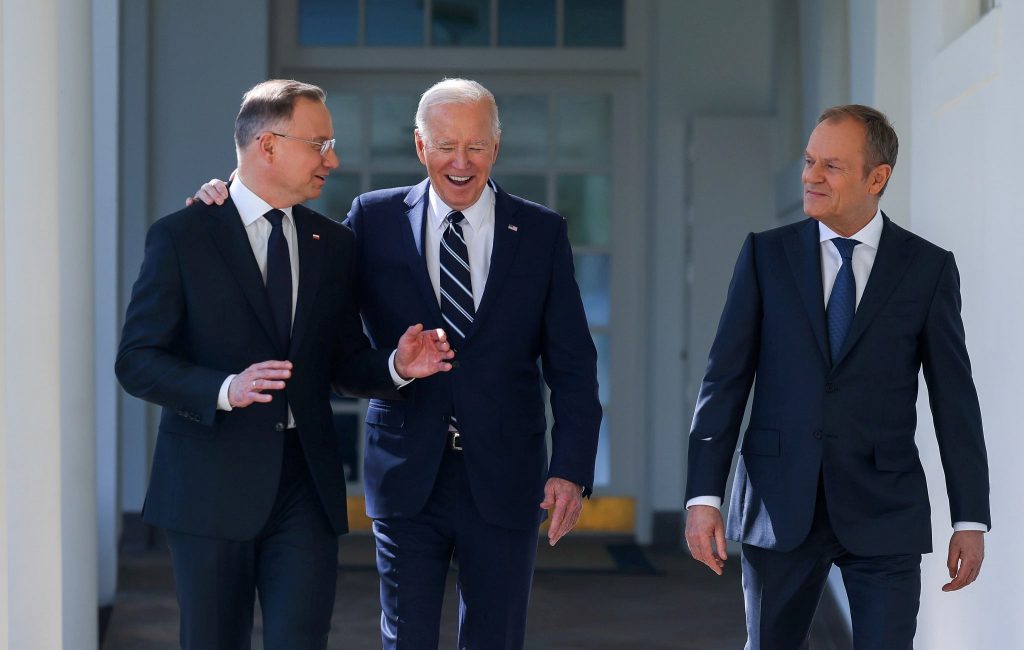
In recent years, especially before Russia’s full-scale invasion of Ukraine, Poland has become, if not the main internal political problem for the EU, then certainly a “problematic relative.” However, all this did not harm relations between the United States and Warsaw, which developed regardless of the pan-European context. Washington continued to single out Poland as a vital US ally in the region. Historically, relations between countries have had long and strong roots. It is enough to recall the times of the American War of Independence, in which the fighter for Polish independence of the 18th century, Tadeusz Kosciuszko, or the influential Zbigniew Brzezinski, national security adviser in the administration of President Carter and a popular international affairs expert, took part.
There is also a Polish lobby in the USA. Back in 1944, an organisation called the Polish American Congress was founded, which by 2024 has branches in 19 states. She represents the interests of more than 10 million Polish Americans. The Polish lobby is not the most influential in the United States and is oriented towards the Republican Party. Among the more significant are Jewish, Cuban, Greek, Turkish and Armenian. However, the Polish lobby, along with the Mexican and Indian ones, is considered a “development” lobby group. The Congress cites Poland’s accession to NATO in 1998 as its main achievement.
Poland and the United States have always had and still have strategic foreign policy reasons for maintaining good relations, mainly containing Russia and “keeping an eye” on the EU, especially Germany. Since joining NATO, Poland has demonstrated its desire to strengthen its close alliance with the United States in every possible way. After Brexit, Poland became the “supervisor” in the European Union from the United States. It turned into a country that always tried to stay ahead of the wishes of its “moderator.” Both jokingly and seriously, they began to call it a “Trojan horse” within the European Union. The growing army compared to other European countries and the strategic alliance with the United States allowed Poland to become a new centre of military power within NATO and strengthened its position in the EU. Poland became one of the few countries of the North Atlantic Alliance that complied with NATO’s requirement for military spending.
No European state purchases as many weapons from the United States as Poland does. Warsaw signs billion-dollar contracts for the supply of weapons and expects to create the most powerful Ground Forces in Europe. Thanks to the large purchase of Abrams tanks, Poland today has Europe’s most oversized armoured vehicles. In addition, the country has become a key deployment centre for the US military. After the Russian full-scale invasion of Ukraine began, the number of US and NATO soldiers in Poland increased to 11,600, accounting for almost 10% of the Polish armed forces. And at the end of December 2023, the US missile defence (missile defence) base in Redzikowo, Poland, came into operation. This was the second such facility in Europe, built as part of creating a US global missile defence system.
By the way, the defence sector did not require the new Tusk government to change the policies of its PiS predecessors. Politicians in Warsaw managed to reach a non-partisan consensus in this area. This concerns the strengthening of the country’s eastern border from a possible attack by the Russian Federation and the modernization of the army. The new head of the defence department, Kosinyak-Kamysh, continues to implement the plans that were implemented earlier. There is also no personnel revolution in the Polish Army. The defence budget was adopted virtually unchanged, and the current opposition assessed this decision positively. Already under the new leadership of the Ministry of Defense, several billion zlotys were allocated for the purchase of ammunition and weapons. US Assistant Secretary of State for European and Eurasian Affairs James O’Brien confirmed the intention of the new Polish government to maintain arms supply contracts concluded with the US by the former government of the republic.
Regarding the concept of creating a European army, the new head of the Ministry of Defense is sceptical about the earlier statement made by the head of the Polish Ministry of Foreign Affairs, Radoslaw Sikorski, who said that “after PiS is removed from power, we will become the leader of the European defence project and will strive to create a European legion.”
“The European Union reacts too slowly to take on defence issues, issues of rapid response,” said Vladislav Kosiniak-Kamysh. The head of the defence department added that at the EU level, it is necessary to strengthen the security of the union’s external borders. At the same time, the minister confirmed Warsaw’s commitment to the North Atlantic Alliance. “We have two alliances that guarantee our security. On the one hand, economic security, which is also part of national security, is the European Union. On the other hand, security of a military nature is NATO. And I wouldn’t mix them,” he said.
On March 12, Polish President Duda and Prime Minister Donald Tusk travelled to Washington to meet with US President Joe Biden. Officially, this meeting is timed to coincide with the 25th anniversary of Poland’s entry into the North Atlantic Alliance. Naturally, at the conference, we will talk about NATO—particularly the upcoming Alliance summit in Washington this summer, strengthening bilateral cooperation in the defence sector, and—if you read between the lines—Poland’s further purchases of American weapons.
The Associated Press, reporting on the visit of Duda and Tusk, called them representatives of two opposing camps of the “political split in Poland.” The prime minister expresses the interests of the new “liberal” coalition, while the president expresses the interests of the previously ruling “right-wing party”. By simultaneously meeting with Duda and Tusk, the American president shows that he not only does not lean towards one of the sides but also acts as a kind of mediator. However, this only matters for the Polish domestic political scene. The Polish president, who was in charge of the American direction during PiS’s reign, tried to actively cooperate with the Republicans and support US President Donald Trump.
Even during a recent tour of African countries, Duda said out loud that Trump always keeps his word. The Polish president did not have such “chemistry” with the democratic administration. Duda was among the last to congratulate Biden on his election as US president. In response, the White House ignored hints about the desirability of inviting the Polish head of state to Washington. This is Duda’s first visit to Washington.
As for Tusk, his sympathies are not on the side of Trump and the Republicans. The prime minister behaves rather unceremoniously on social networks when he comments on specific actions of congressional members from the Republican Party who are blocking the release of financial assistance to Kyiv. Several Republican politicians have already asked Tusk not to interfere in their affairs. Moreover, Tusk, as we have already noted, supports Berlin and Paris’ plans to strengthen European autonomy.
At a meeting in Paris, Donald Tusk said that “…energy, food and defence are the three pillars of our joint security, and I would like Poland and France to cooperate here, extremely intensively.” The Polish opposition represented by PiS, which previously called Tusk a “German spy”, already sees in him an “agent of Paris” who is ready even to disrupt the contract concluded by Law and Justice with the American company Westinghouse for the construction of the first nuclear power plant in Poland to transfer to his French.
All of Tusk’s actions make it clear that if Trump wins the US presidential election, he will have a reserve “European parachute.” Therefore, during the visit of the Polish President and Prime Minister, Biden will undoubtedly make every effort to slightly level out the emerging “European tilt” of Warsaw and, for example, offer it delicious “military candy” in the form of additional American participation in the development of the Polish defence sector and readiness send several thousand more troops there. Such statements can also help Biden electorally since they can attract additional sympathy from Americans of Polish origin, which is essential for the current administration, opposing the growing momentum of Trump.
Conflict after a warm welcome
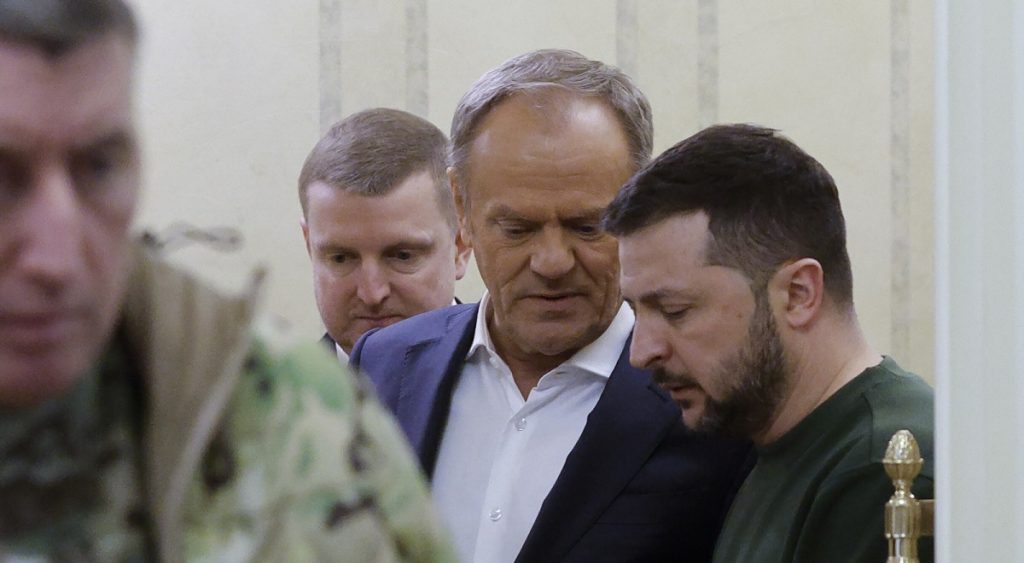
Relations between previous Polish authorities and Ukraine have always been complex. However, after Russia’s full-scale aggression against Ukraine, the PiS government clearly sided with Kyiv. Warsaw transferred more than 300 tanks, hundreds of armoured vehicles, dozens of artillery installations, and vast quantities of small arms and ammunition to Ukraine. The then Prime Minister of Poland, Morawiecki, stated that the cost of supplies exceeded €3 billion. In addition, other Western countries are transferring weapons to Ukraine through Poland. Many Ukrainian Armed Forces personnel were also trained in Poland, and damaged equipment was repaired. At the same time, Warsaw refused to supply Russian oil and gas, became one of the prominent supporters of imposing sanctions against Russia, supported European restrictions and introduced its own.
For a long time, Poland was the first European country in terms of the number of refugees accepted, only losing this position to Germany in 2023. Many charitable foundations that help war victims and the Armed Forces of Ukraine are in Poland. “Not just partners, but friends forever,” is how Ukrainian President Vladimir Zelensky described relations with Poland in the spring of 2022. However, after a year and a half of war, there was a chill in the warm friendship between the two countries. Gradually, various contradictions began to surface. In the spring of 2023, Poland remembered numerous historical claims. The country’s Foreign Ministry then stated that Kyiv had still not accepted responsibility and had not apologized for the Volyn massacre of 1943. Speaker of the Verkhovna Rada Ruslan Stefanchuk had to speak in the Sejm and say that he “understands the pain of the Poles.” Economic ones supplemented Poland’s historical claims.
It should be recalled that in 2014 Kyiv signed an Association Agreement with the EU. Ukraine is one of the world’s leading exporters of first-tier agricultural commodities, such as sunflower oil, barley, corn and wheat. Unlike, for example, Poland and other close Western neighbours, it is not a member of the EU and has some restrictions on trade with Community countries. Russian aggression against Ukraine and the blockade of Ukrainian Black Sea ports have severely limited the country’s ability to ship export goods to foreign markets and deprived it of an essential source of income.
In June 2022, Brussels quickly abolished all tariffs and quotas on Ukrainian imports to facilitate transit along land “solidarity routes” through Poland, Romania and other EU countries that provided an alternative to the Black Sea route. The Regulation on Autonomous Trade Preferences (ATM), introduced by the European Commission concerning Ukrainian goods, was automatically extended in 2023.
Indeed, the free trade regime has led to a sharp increase in the supply of Ukrainian-made agricultural products to the European Union market. However, despite the growth in exports, the volume of Ukrainian products on the European market did not exceed 1.5–2%. Moreover, these indicators apply even to those products that caused the most considerable stir: grain, chicken meat, chicken eggs and sugar.
Despite the relatively low impact on the overall situation in the European agricultural sector, the very factor of the abolition of export quotas served as a reason for protests.
Polish farmers who alleged unfair competition. The dispute erupted in April 2023, when exported Ukrainian grain reduced local producers’ prices due to overstocking warehouses. In fact, Ukrainian grain, which has a lower cost, not so much influenced the market situation (for example, the level of Ukrainian grain exports in 2023 was three times lower than Russian exports) but somewhat deprived local traders of the opportunity to create an artificial shortage, and accordingly – regulate market prices.
As a result, Poland, Hungary and Slovakia immediately introduced bans on Ukrainian products, and Romania and Bulgaria agreed on licensing and control of flows. The European Commission called these bans unacceptable, illegal in the EU and contrary to the spirit of Community solidarity. But with farmer dissatisfaction threatening to undermine EU solidarity with Ukraine and rural votes crucial in the EU’s ruling elite’s crucial June elections, the European Commission agreed to an interim agreement. It allowed the transport of four Ukrainian goods – wheat, corn, rapeseed and sunflower – in transit to external markets through neighbouring EU countries without leaving them there either for domestic consumption or storage.
The arrangement ended in September. However, Poland, Hungary and Slovakia have maintained national bans. In September 2023, Warsaw introduced an indefinite embargo on the import of Ukrainian grain. The Kyiv authorities responded by complaining to the WTO, after which Polish President Andrzej Duda refused to meet with Zelensky and also compared Ukraine to a drowned man dragging a rescuer to the depths. Polish ministers promised not to supply any more weapons and to block Ukraine’s accession to the European Union.

A new scandal broke out in November 2023 while the PiS government was still in force. Polish truckers were outraged by competition from their Ukrainian colleagues and blocked checkpoints on the border of the two countries. As a result, gigantic traffic jams formed, and carriers were not allowed through, including trucks with humanitarian aid and fuel tanks; by the beginning of December, the damage to the Ukrainian economy amounted to €1 billion. The action began in protest against Brussels’ decision to abolish entry restrictions for Ukrainian carriers. Farmers from Central European countries also supported the Poles and took their competitors with hostility. The conclusion was unoriginal: “friendship” and “brotherhood” are not suitable for the lexicon of international politics, no matter how much the presidents hugged the day before. At the same time, in Kyiv, they said that Ukraine should wait for the change of power in Poland. After relations normalise again, the contradictions will fade into the background.
Donald Tusk, who came to power, immediately promised to eliminate the crisis in Polish-Ukrainian relations and resolve all differences through dialogue. His first statements looked very optimistic: “… assistance to Ukraine should become one of Poland’s foreign policy priorities. I cannot listen to those who say they are tired of the situation in Ukraine. The task of the new government is to loudly demand that the Western community help Ukraine in this war.”
Donald Tusk’s words came when the United States and the European Union were mired in disagreements over the parameters of further support for Ukraine. According to the Polish prime minister, European allies should increase investment in defence and “not pretend that nothing is happening.” “There can be no hesitation on such an issue as armament and support for Ukraine in the war. For me, this is an obvious fact,” said Mr. Tusk.
In other words, the politician did his best to make it clear that he was an alternative to the previous authorities in everything, and most importantly, he was ready, as befits a close ally, to set an example for others. Also, as in the case of domestic policy, there was no agreement among the Polish establishment on Ukraine.
Tusk’s attempts to shift the focus of Polish-Ukrainian relations to the global level did not obscure the topic of agricultural contradictions between the countries. And without resolving disputes in this area, it is unlikely that anyone will agree with Donald Tusk that cooperation between Warsaw and Kyiv under him has returned to the level of “closest allies.” However, during a visit to Kyiv in January 2024, Tusk promised to resolve, among other things, differences related to recent protests on the Polish-Ukrainian border. However, talking is one thing, but doing is quite another.
The all-Polish protest of farmers began on February 9. Farmers protested throughout the country, blocking roads to checkpoints on the border with Ukraine. Near the Medyka-Shegeni checkpoint, protesters blocked the railway and scattered Ukrainian grain and grain carriers, and at the Rava-Russkaya-Grebennoye checkpoint, Polish protesters stopped a passenger bus. Tusk promised to unblock the border for military and humanitarian cargo and to include the border crossing point on the border with Ukraine, nearby sections of highways and railways in the list of critical infrastructure. The situation was heating up every day. To resolve the problem, Vladimir Zelensky suggested that the Polish prime minister hold a meeting at the border and resolve problematic issues. Donald Tusk rejected the proposal, saying that a meeting was needed. Still, a substantive and technical one, and not a symbolic one, as, in his opinion, a meeting on the border of the two countries would be.
At the same time, pressure from Polish farmers continued to grow. On February 27, a “March to Warsaw” organised by agricultural unions took place, in which tens of thousands of farmers and their supporters participated. On the one hand, they demanded a rejection of the EU’s Green Deal, which dictates many new conditions and rules for European farmers in ecology and the fight against climate change. For example, limiting the use of pesticides and chemical fertilisers, regulating water use, responsibilities for landscaping, and preserving and creating habitats for wild fauna. All this, naturally, requires additional costs, increases the cost of products and hits the pockets of manufacturers.
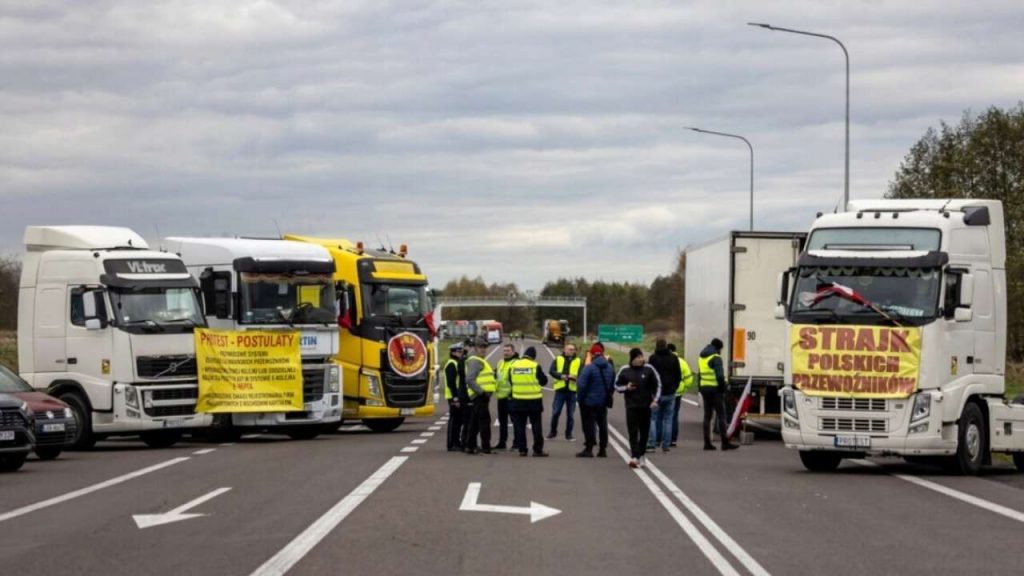
Indeed, the EU agricultural sector is somewhat compensated by subsidies, but through a complex and bureaucratic system of control and reporting. This is the first and foremost group of reasons for the unrest of European farmers. The second demand of the protesting farmers concerned the end of uncontrolled access to Poland of agricultural products from Ukraine. One of the posters during the farmers’ demonstration in front of the Polish Sejm in Warsaw even read: “No more poisoned food from Ukraine in Polish stores.” The severity of the problem reached its climax: Representative of the State Border Service of Ukraine, Andrey Demchenko, noted that as of March 3, truck traffic was blocked at all checkpoints along the border.
“Fortunately, the protesters on the other side of the border are not blocking traffic for other categories of transport – these are, in particular, cars and buses used by ordinary citizens. Therefore, traffic is free in both directions,” noted Andrey Demchenko. Besides, according to Demchenko, at checkpoints on the border of Ukraine with Romania, Hungary and Slovakia, there are large queues due to Polish farmers blocking the Polish-Ukrainian border. Drivers must use detour routes, increasing the load on empty checkpoints.
Meanwhile, Poles started discussing the possibility of temporarily closing the border with Ukraine. Ukrainian President Vladimir Zelensky demonstrated obvious irritation with what was happening. In his video statement on March 3, he emotionally stated: “… the situation on the Polish border has long gone beyond the limits of economics and morality. It is simply impossible to explain how the complexities of a bleeding country can be used in internal political struggles.” It is indeed possible to agree with the Ukrainian president because, as noted above, the level of Ukrainian exports does not seriously impact the European market. Moreover, regular statements by Europeans (mostly Polish farmers) about the low quality of Ukrainian products are also untrue. According to the signed association of Ukraine with the EU, any Ukrainian products produced for export to the European market must comply with all EU production technologies.
And indeed, Tusk is electorally vulnerable today. The relative success of Tusk’s coalition in the last parliamentary elections will need to be consolidated in the April elections to local authorities and the June elections to the European Parliament. Polish farmers are an important electoral group for many parties. And the fight will be for every vote. Therefore, the discontent of farmers is very inappropriate, and Tusk needs to demonstrate that the government is on their side while at the same time maintaining the role of the most consistent supporter and defender of Ukraine in the EU. In addition, Tusk’s coalition represents a shaky alliance of liberal, left and agrarian parties, the collapse of which could lead to the loss of Tusk’s already slim majority in the Sejm. In a properly functioning democracy, on the path to victory, you have to be careful and consider the different moods of voters. Until the elections, of course, and then follow the planned course.
Tusk came to the defence of Polish farmers and called the EU’s decision to remove barriers to Ukraine “reckless,” promising to fight, if not for the abolition of the European strategic project “Green Deal,” then for its significant adjustment. Hot on the heels of the March on Warsaw, Donald Tusk met with its organisers and active participants. After this conversation, he stated that they “are on the same side” and assured that the Poles want to help Ukraine and will help it, but this support should not be at the expense of the interests of Polish farmers.
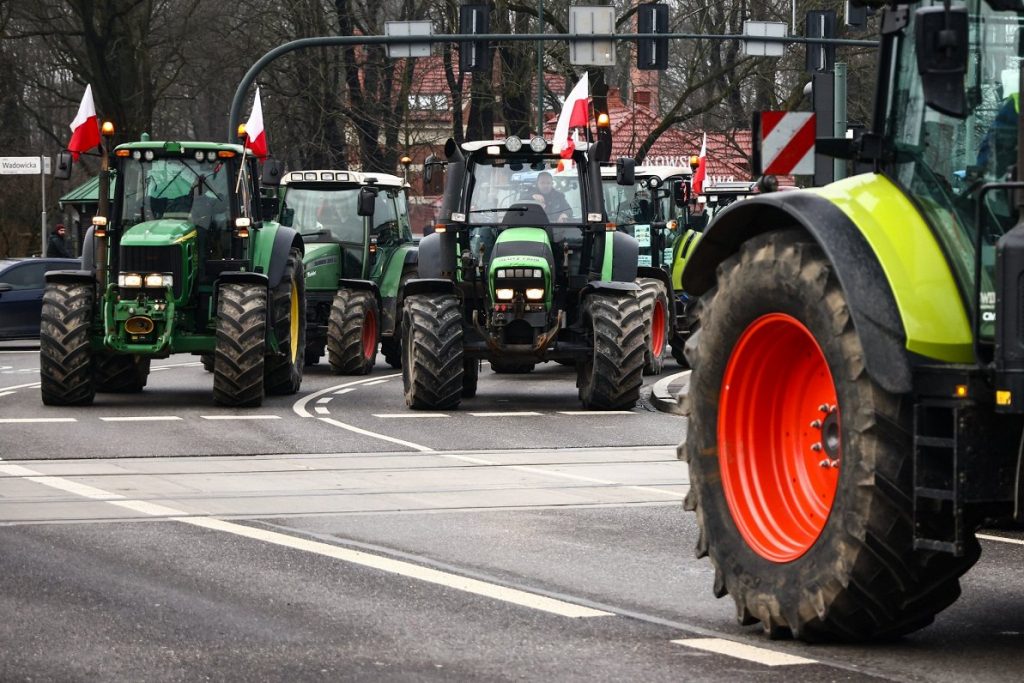
Vladimir Zelensky called on Brussels to intervene to avoid political manipulation of the dispute between Warsaw and Kyiv over agricultural imports. A similar situation has developed in the EU. The wave of protests across the 27 EU member states has posed a severe challenge to leaders, who strongly support Ukraine but are forced to respond to growing social discontent as European Parliament elections loom.
Populists and the far right, whose influence is growing against the backdrop of the crisis, have picked up the anti-Ukrainian theme, the population’s fatigue from the war, and the rise in food prices, which has hit the “masses,” as election flags. Although the balance of power in the future European Parliament will change, experts predict that its core will remain the same, and the head of the European Commission, representative of the German Christian Democrats Ursula von der Leyen, has every chance of remaining for a second term.
In the meantime, the European Commission has not responded for several months and, it seems, will not react to Poland’s actions. Brussels hopes for bilateral negotiations and agreements between Warsaw and Kyiv, which, like a similar agreement with Romania, would limit grain imports while maintaining the legal appearance that the Poles are not violating the rules of the EU common market.
Negotiations between Warsaw and Kyiv are ongoing but complicated. Prime Minister of Ukraine Denis Shmyhal came up with the initiative to adopt a “Plan of Mutual Understanding” together with Warsaw. Among other things, it assumes Ukraine’s consent to the European Commission’s restrictions on exporting Ukrainian poultry meat, eggs and sugar to the EU. In addition, Kyiv proposed that Warsaw jointly appeal to Brussels to ban the import of Russian agricultural products into the EU. The Ukrainian authorities also proposed creating a trilateral headquarters Ukraine-Poland-EU, which could deal with trade problems promptly.
However, for now, the Ukrainian plan remains only on paper—nothing is known about specific agreements. Polish Prime Minister Donald Tusk invites Kyiv to hold government talks in Warsaw on March 28. At the same time, Donald Tusk supported at least one point of the Ukrainian plan. On March 4, the head of the Polish cabinet visited Vilnius, where, during negotiations with his Lithuanian colleague Ingrida Simonyte, he said: “I would like to inform you that today I will appeal to the speaker of parliament with a proposal for a resolution calling on the European Commission to impose sanctions on food products from Russia and Belarus.”
It is unlikely that after March 28, the situation between Poland and Ukraine will change dramatically. Experts suggest that it is unlikely that the border will be closed for Ukrainian products. Instead, an attempt will be made to put a mutual face on the wrong game and resurrect a semblance of the former normality in the relationship. After all, Poland is an importer of agricultural products from Ukraine and the leading exporter of food products to Ukraine. The European Union is well aware that the matter is not only about increasing the export of cheap Ukrainian food, which has essentially become a political marker, or about the “green policy” of Brussels and the Common Agricultural Policy of the European Union, which remains one of the most important and fundamental factors for the entire Community. The current trend in cereal prices in Poland also correlates with European and world prices. The fall in prices is the result of global markets, and, according to many analysts, prices will inevitably continue to fall even after the ban on Ukrainian imports is introduced, which is more of a political factor.
Bottom line
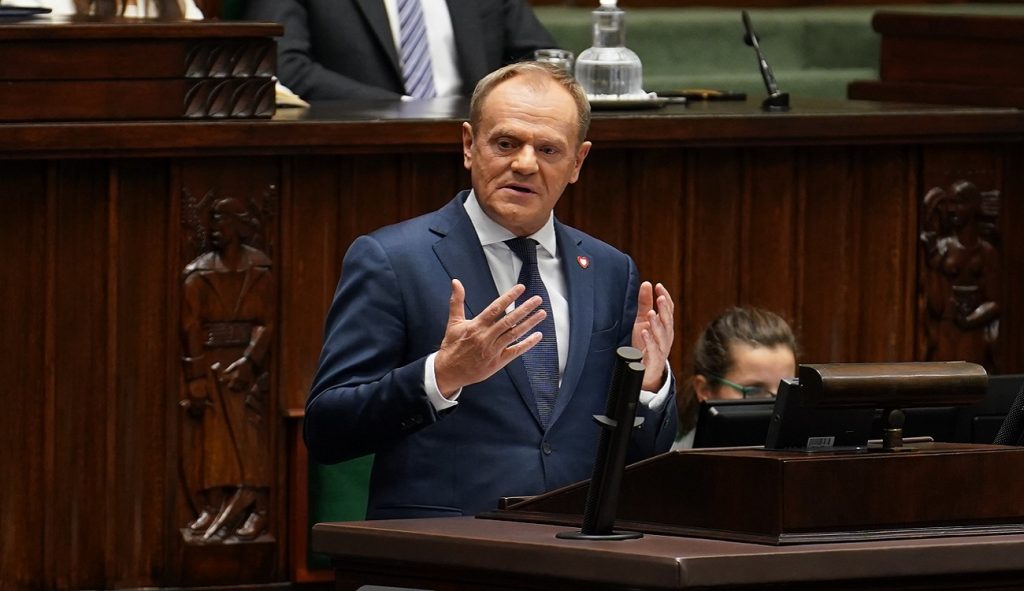
The internal political situation in Poland is highly dependent on several factors. The first of these is local elections, which are scheduled for April 7th and 15th. However, even if this stage of strengthening Tusk’s power is successful and an environment more favourable to the new prime minister is formed at the level of local authorities, one should not expect a period of calm and calm. As for the entire European Union, one of Poland’s most important events in the near future is the elections to the European Parliament, which will take place on June 6. In this context, it is important to note another phenomenon of Donald Tusk: he is currently still one of the key leaders of the European People’s Party, a political force that unites Christian Democrats and Conservatives in the European Union. With his vast experience in European politics, Tusk is precisely the leader who can not only help maintain the EPP’s leading position, but also contribute to the re-election of Ursula von der Leyen for a second term as President of the European Commission. Of course, being such an important trump card, Tusk has no opportunity to stumble and is well aware of his role in the future architecture of the European Union.
Another aspect – the same time, Poland will gradually prepare for presidential elections, which promises to be less attractive for external observers. There is no need to talk about calm in such a busy electoral schedule.
However, considering the Ukraine factor, we can expect a reduction in escalation and a gradual resumption of the “good neighbourly” approach to trade turnover by mid-June. Following this, similar warming may occur on the political plane.
On the other hand, unfortunately, or fortunately, Polish-Ukrainian relations, both in matters of border disputes and historical parallels, are not a critical factor in Poland’s domestic policy. This means that having resolved the issue with its neighbours; Tusk will not be able to secure a more stable position against the backdrop of more critical internal and external challenges for Warsaw.


